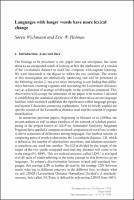Chapter Languages with longer words have more lexical change
Author(s)
Wichmann, Søren
Holman, Eric W.
Contributor(s)
Saxena, Anju (editor)
Borin, Lars (editor)
Collection
European Research Council (ERC); EU collectionLanguage
EnglishAbstract
The findings to be presented in this paper were not anticipated, but came about as an unexpected result of looking at how the application of a version of the Levenshtein distance to word lists compares with cognate counting. We were interested in the degree to which the two correlate. The results of this investigation are intrinsically interesting and will be presented in the following section 2, but even more interesting is our finding that differences between counting cognates and measuring the Levenshtein distances vary as a function of average word lengths in the word lists compared. This observation will occupy the remainder of the paper, with section 3 devoted to establishing the statistical significance of the observation across language families, while section 4 establishes the significance within language groups, and section 5 discusses competing explanations. First we briefly explain the specific version of the Levenshtein distance used and the concept of cognate identification.
Keywords
Linguistic differencesDOI
10.1515/9783110305258.249ISBN
9783110488081OCN
1135849104Publisher
De GruyterPublisher website
https://www.degruyter.com/Publication date and place
Berlin/Boston, 2013Grantor
Classification
Linguistics


 Download
Download